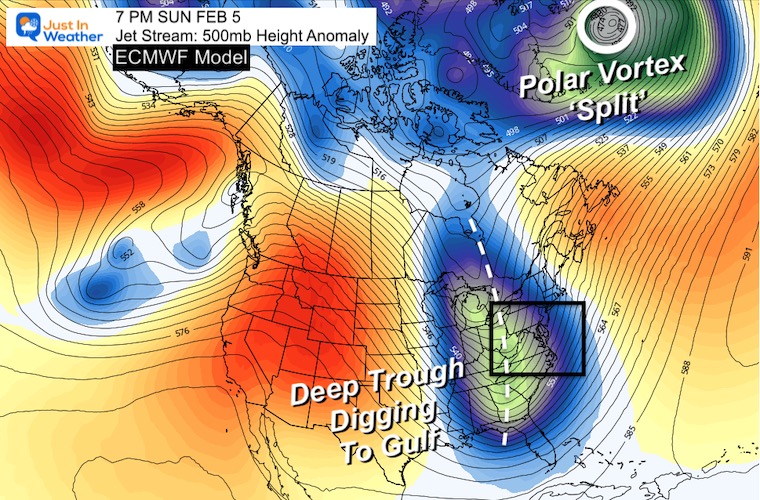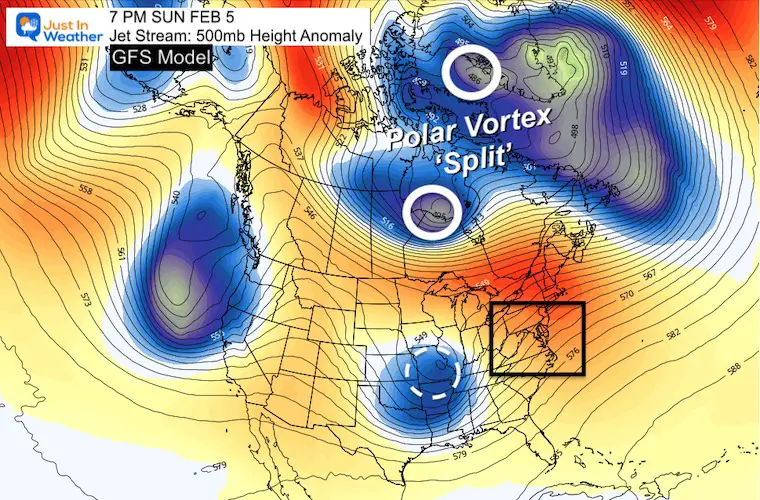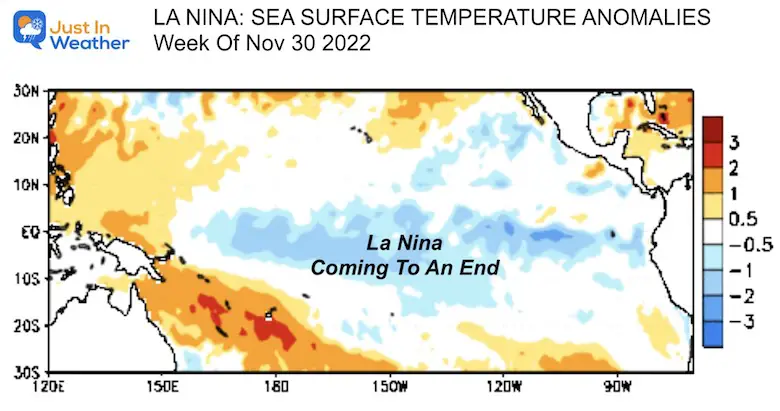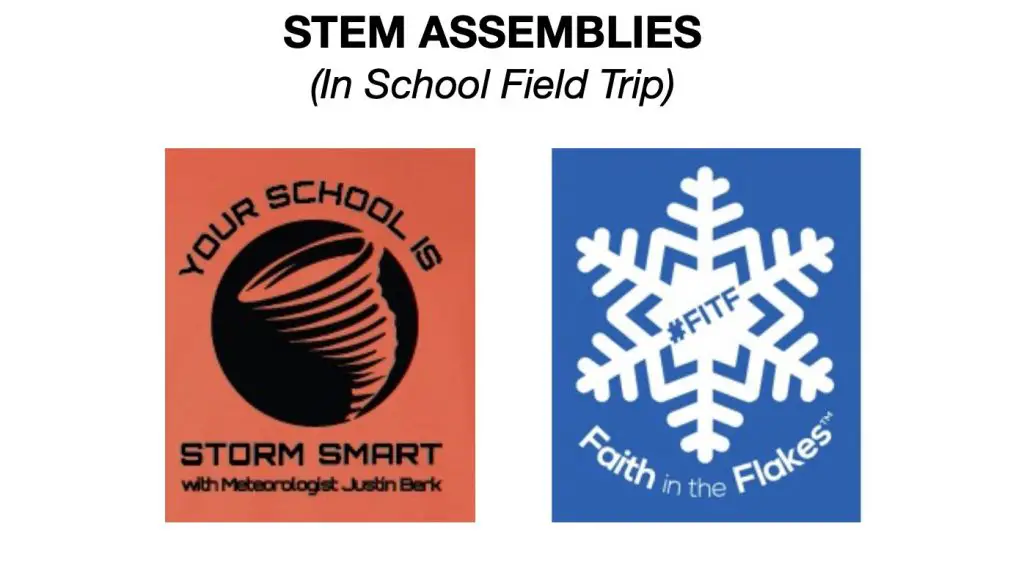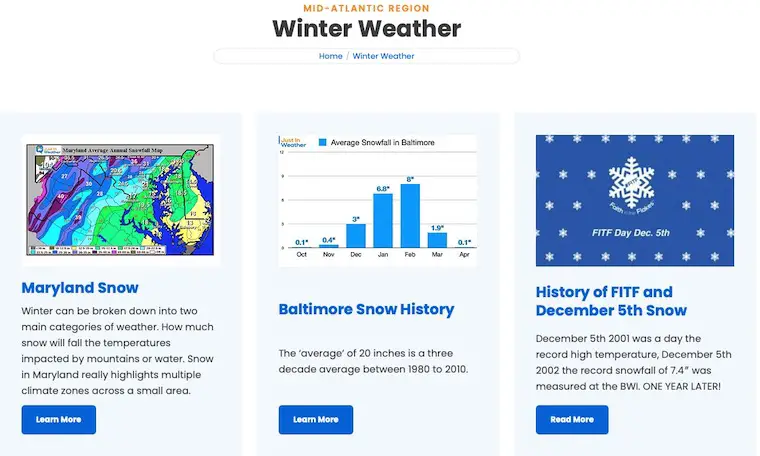February Becoming More Favorable For Winter In The Eastern US: La Niña May Help Later
January 26, 2023
Friday Afternoon Update
I do NOT make weather promises more than a week away. What I do see are signals for a change in the atmosphere, and this far out, I’m simply comparing how different computer models are handling them. They are guidance but not great with fine details.
As we begin to focus on the weather pattern next week, I want to start with my inner conflict. I have high confidence that temperatures will be trending colder across the Eastern US. However, there is no guarantee that it will bring snow. There is hope for winter lovers as the energy will be trying to catch up to the colder air. There is also Global Support for the rest of winter, which I will touch on below (La Niña coming to an end).
In my outlook update last night, I showed a very aggressive European Model trying to bring a strong coastal winter storm next weekend. I wrote on that map that I intended it to change, and it has. I expect we will see more changes ahead, and comparing to other models, it can become quite dizzying. My goal is to share enough to keep you in the loop and focus on the prize. That prize is snow for fellow boarders, kids (at heart), and anyone frustrated by this snow drought.
I’m not alone…
A few have asked what Dr. Judah Cohen, our arctic expert, has said about this. He seems to be excited too. I agree: The NEXT FEW WEEKS are our BEST CHANCE for snow around I-95.
Wise words “expect the worst, hope for the best.” The Canadian ensembles show strongest signal yet for #snowfall in the Mid-Atlantic States for the first week of February. Signal in the GFS ensembles much weaker. The next few weeks is the best chance to end the I95 #snow drought pic.twitter.com/TWdlL8SmYK
— Judah Cohen (@judah47) January 26, 2023
Starting With The Jet Stream
I will show two models, then compare them below.
ECMWF Model
The Euro does show the Polar Vortex becoming dislodged, allowing a pool of colder air to spill into the eastern US. The circulation itself will remain in Canada. However, an elongated deep trough will dip all the way to the Gulf of Mexico next weekend. This helps to feed the notion of colder air and a costal storm.
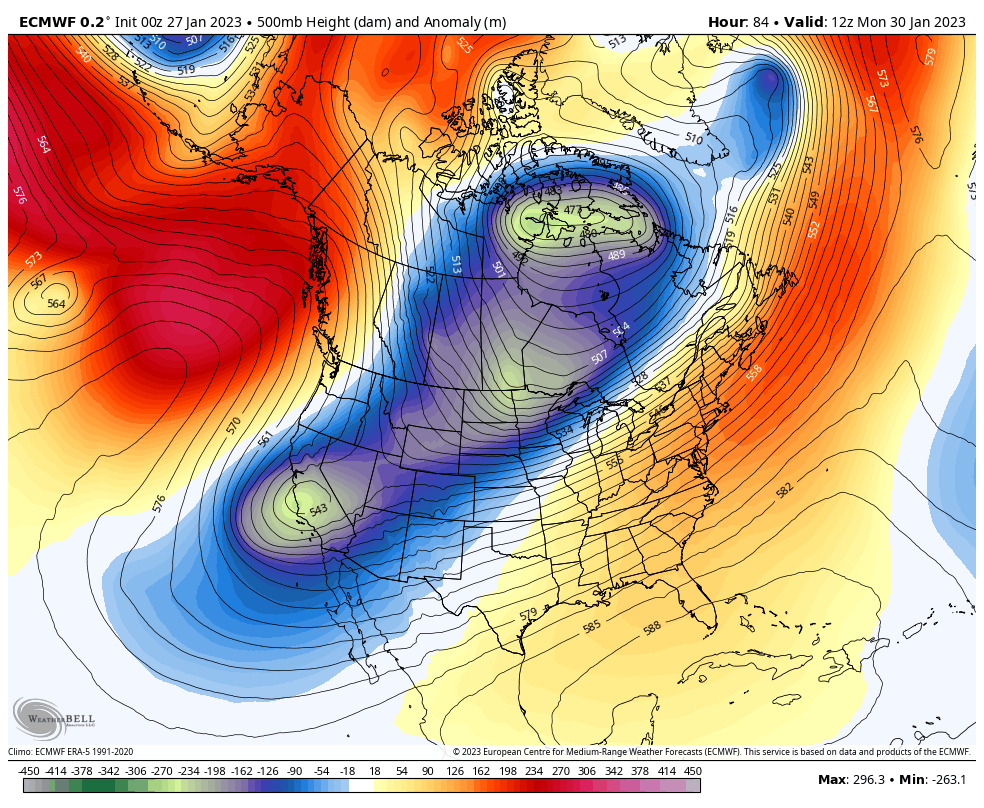
Snapshot: Sunday Feb 5
GFS Model
Our American product starts the same, but splits the Polar Vortex. This delays the trough impact in the US, thus allowing that next storm to form later and track to our west. That would be a familiar sight and once again a rain maker for the East Coast.
Snapshot: Sunday Feb 5
Compare and Contrast
I chose this February 5th spot because it is the end of next weekend, and when the Euro has a coastal storm forming.
It is amazing that just 9 days away there can be such a dramatic variation of results. At this point it is prudent to lean on the European Model as it has been more reliable and holds credibility.
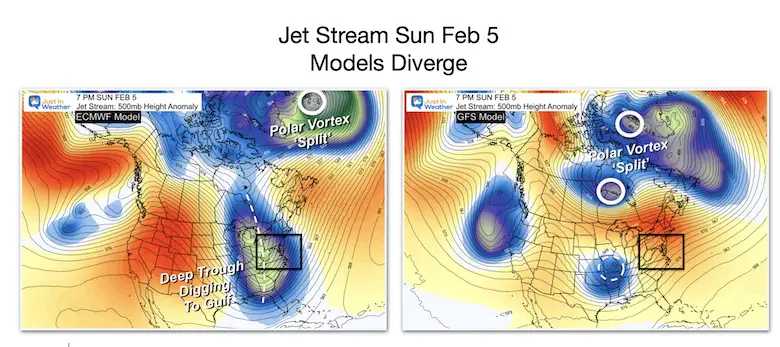
Surface Contrast
See the animations below…
This is the same time frame from the above image, just the surface reflection. Here we see the drama play out. Euro has a coastal storm forming, albeit much smaller than it showed in prior plots. The GFS is vacant of active weather. This actually brings the Low in a day later and much farther west… See below.
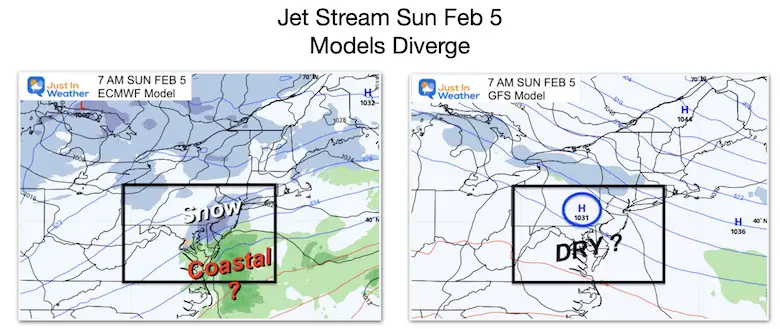
ECMWF Model Animation
Tuesday Afternoon to Sunday Night
Look closely and see the snow actually get pushed farther south, barely clipping southern Maryland. I don’t buy this solution. The end shows the coastal storm, compact but enhancing for New England NEXT Sunday.
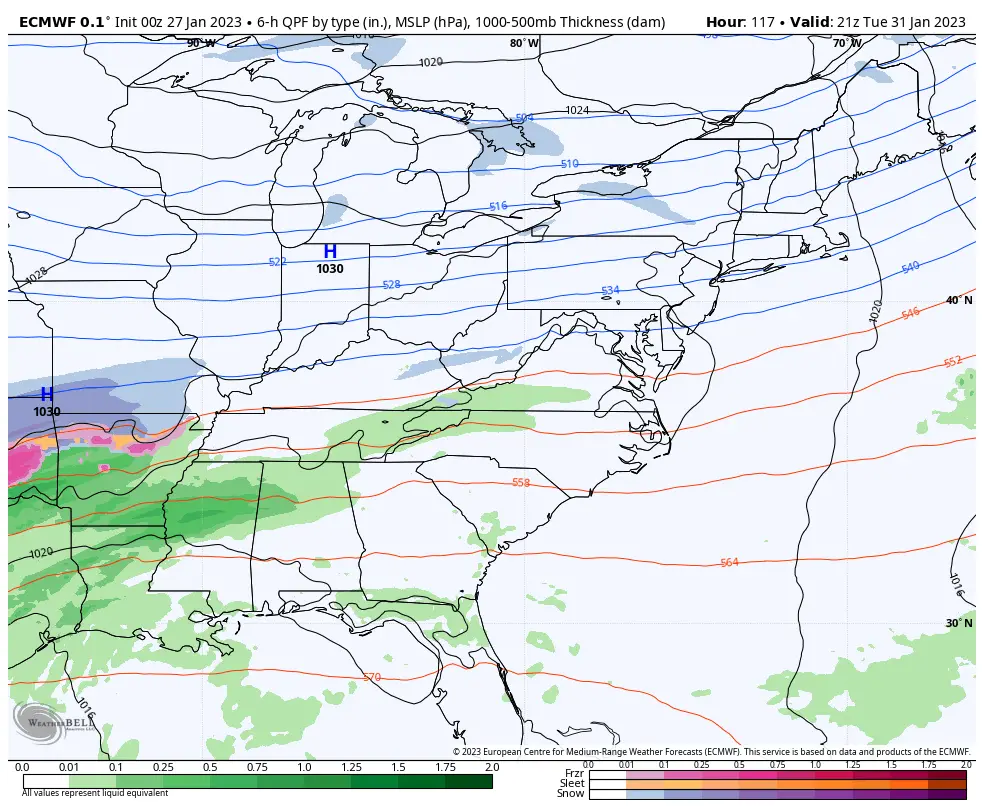
Snapshot Sunday Morning
Here is the location of the compact snow ‘suggestion’ for the Mid Atlantic.
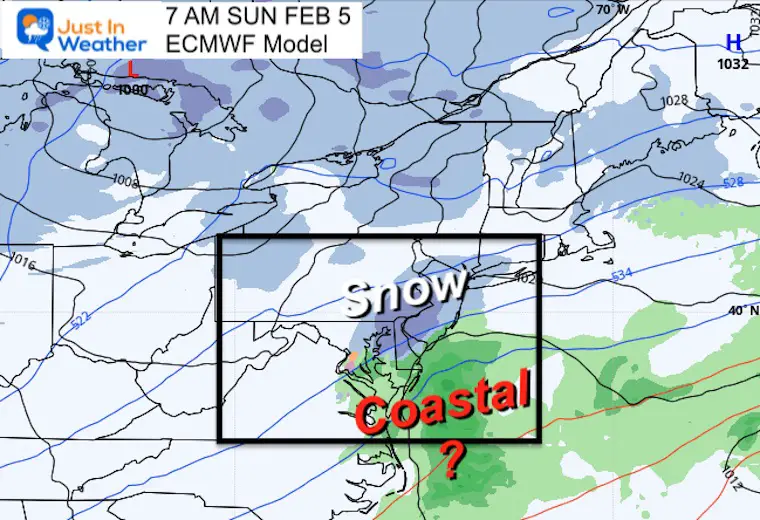
GFS Model Animation
Tuesday Afternoon to Monday Afternoon Feb 6
This also surpasses the snow South of Baltimore. Then that larger storm is delayed until Monday, with a warmer inland track. The result (if true) would be rain.
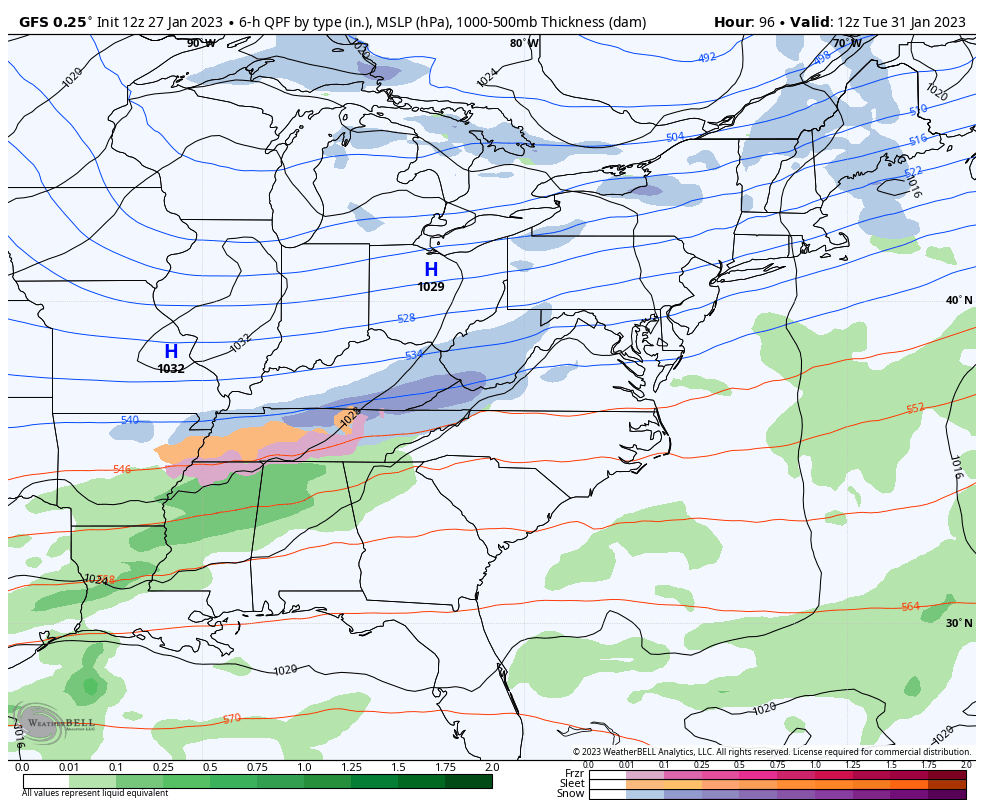
Snapshot Sunday Morning
This is the time when the Euro showed the Mid Atlantic storm forming.
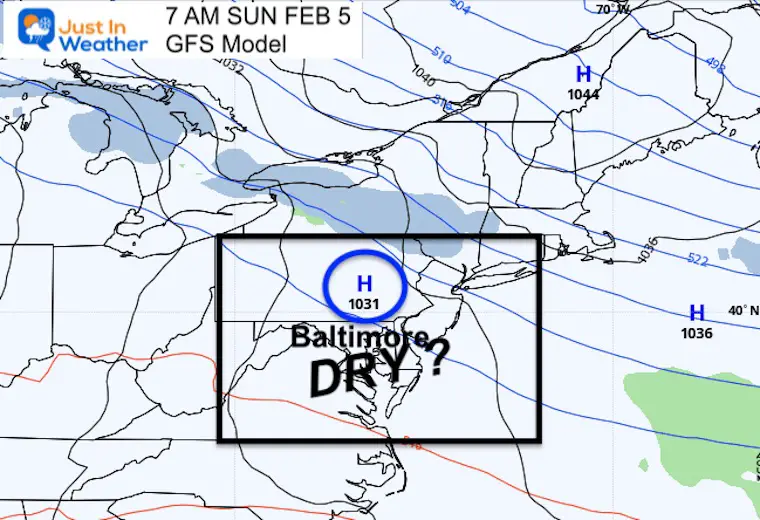
Snapshot Monday Morning
This is the inland Low track, keeping us on the warmer and rainy side.
The next 10 days are still uncertain, but definitely favorable from an atmospheric standpoint. My buddy Tony Pann has been happy for this as well. I am not as bold as him to block people for denying, but I feel his frustration at being overwhelmed by many doubters.
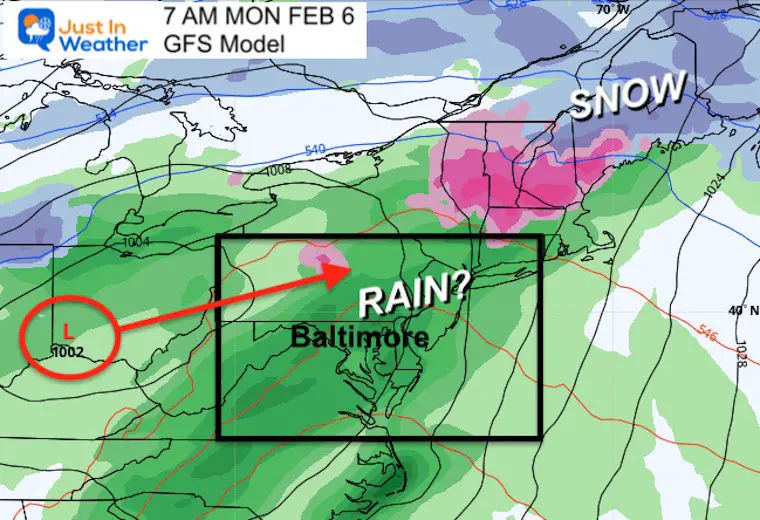
Baltimore could be “in the game” next week. -AO/ +PNA could beat down the SE Ridge for a while, as a series of storms travel along the Southern Edge of the cold air. 👇 Bottom line: Looks good for snow next week. I’ll block anyone who says: “I’ll believe it when I see it!” 😁❄️🚂 pic.twitter.com/lnEseuA5f4
— Tony Pann (@TonyPannWBAL) January 26, 2023
Dr. Cohen is still expecting a SECOND STRETCH of the Polar Vortex after this one… So if one of these do not work out, there may be more behind it.
Every world class athlete knows that to perform at the highest levels you need to stretch & so it seems with the #PolarVortex (PV). One PV stretch ongoing, delivering #cold & #snow to North America & models increasingly suggest yet another stretched PV for second week of February pic.twitter.com/g4fu614Lyq
— Judah Cohen (@judah47) January 27, 2023
La Niña Is Weakening
This is the Sea Surface Temperature Anomaly
Nov 2 2022 to Jan 18 2023
The blue is the region of below normal tropical water temperatures in the Pacific along the equator. That area is shrinking, suggesting the ending of this La Niña.
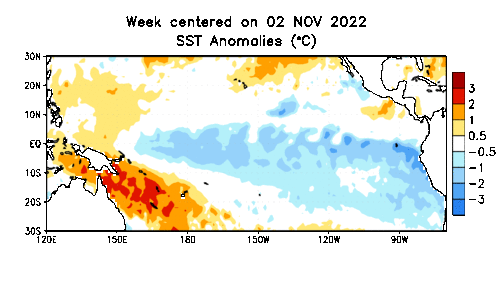
La Niña Update: From Columbia Climate School
- In mid-January 2023, sea surface temperatures in the central-eastern equatorial Pacific remain below-average. Key oceanic and atmospheric variables have remained consistent with La Niña conditions, though there are indications that this is weakening.
- A CPC La Niña Advisory still remains in place for January 2023.
- The majority of models (19 out of 23) in the IRI ENSO prediction plume predict SSTs to transition from the level of a La Niña to ENSO-neutral state during Feb-Apr, 2023.
Take Away:
The end of winter is more favorable for our weather pattern as the Tropical Pacific should end the Triple Dip La Niña and go neutral.
This is what I reported back in early December: Click here for that report
Latest Measurable Snow In Baltimore
- Today Is Solo For 3rd Latest
- Feb 21 in 1973 (50 years ago)
- Feb 6 in 1914 (109 years ago)
- Jan 27 in 2023 (Today)
- Jan 25 in 1992 ( 31 years ago)
- Jan 25 in 1901 ( 122 years ago)
- Jan 23 in 1966 (57 years ago)
Also See:
Winter History: Low Snow And Late Starts
See my research based on Baltimore data since 1883.
Subscribe for eMail Alerts
Weather posts straight to your inbox
Sign up and be the first to know!

STEM Assemblies/In School Fields Trips Are Back
Click to see more and ‘Book’ a visit to your school
My Winter Outlook: Not A Typical La Niña!
I see many factors to support colder influence with multiple systems. Early and later in winter. Check it out.
October 27 Nor’easter Recap Still Breezy Then Next Storm Friday
Also See The Winter Outlook Series:
October 27 Nor’easter Recap Still Breezy Then Next Storm Friday
Farmer’s Almanac Comparison
September Starts Meteorological Autumn: Weather Climate Stats For Maryland at Baltimore
Triple Dip La Niña Winter
CONNECTION TO WINTER?
If you want a snowy winter, this is what you might want to look for in the rest of the tropical season.
Rainbow Ice Cave In Mt. Rainier A Very Rare Find: Photos And Video
Wooly Bear Caterpillars
https://justinweather.com/2022/10/25/winter-weather-outlook-from-the-wooly-bear-caterpillar/
Persimmon Seeds
Click to see Top 20 and MORE
Winter Weather Folklore Top 20 And More Outlook Signals From Nature For Cold And Snow
Normals And Records: Maryland and Baltimore Climate History
Please share your thoughts, best weather pics/videos, or just keep in touch via social media
-
-
Facebook: Justin Berk, Meteorologist
-
Twitter: @JustinWeather
-
Instagram: justinweather
-




